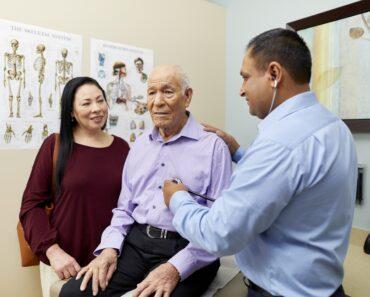By Fahd Almohid, M.D., Primary care medicine, Geriatric, and Endocrine Specialist, Conviva Live Oak
Alzheimer’s is a type of dementia that affects memory, thinking, and behavior. It accounts for 60-80% of dementia cases. The majority of those afflicted are 65 and older, but early-onset Alzheimer’s has also been diagnosed.
This is a progressive neurodegenerative disease with no cure because once brain cells are lost, they do not regenerate. On average, the life expectancy is between four and eight years after diagnosis, but some people can live as long as 20 years, depending on other health factors. Dementia is a general term for a decline in mental ability severe enough to interfere with daily life. Alzheimer’s is a specific disease and is the most common cause of dementia.
Warning Signs
Changes in the brain begin years before symptoms start and worsen over time. The early-stage symptoms are short-term memory loss, difficulty performing normal work-setting tasks, misplacing a valued object, or forgetting what was just read. At middle stage, patients forget events or personal history, appear moody and withdrawn, and cannot recall information, like a home address or phone number. They also experience confusion and anxiety, show personality and behavioral changes, require help choosing clothes, and may have bladder and bowel control issues. Patients may also tend to become lost. In late-stage dementia, symptoms are severe. Individuals can’t normally respond to their environment or carry on a conversation, and eventually, they lose control of movement. They may say words or phrases, but communicating is hard. Extensive care is required as memory and cognitive skills worsen and patients exhibit significant personality changes.
Diagnosis
Progression rates vary; family members are usually the first to notice memory loss as it becomes a repeated behavior. Conviva patients 65 and older receive yearly cognitive screenings, and those 85 and older receive even more intensive screenings. For those in the 65- to 85-year-old range, a neuropsychological test called MiniCog is performed to determine any early impairment. More testing with a positive screening result is required, but negative results only require an annual retest. For those 85 and over, providers perform the St. Louis University Mental Status (SLUMS) screening to identify any cognitive impairment.
Conviva Cares
Conviva has social workers to help meet patients’ and caregivers’ needs, and there’s a high-risk program for patients requiring advanced care. Conviva assists with community support, and our activity centers are open for social engagement, including dementia caregiver support talks. Additional services are available for VA-eligible patients, and Conviva can help connect patients and caregivers with those options. There’s also home health care where visiting nurses help caregivers manage an Alzheimer’s patient.
Most of the cognitive testing is done at a Conviva clinic, which saves time and helps prevent care delays. It’s also better that patients with dementia see a physician they are familiar with to minimize the distress of seeing so many new people.
Support Options
There are medications to treat anxiety and slow down the disease’s progression. Supportive care is important but requires substantial lifestyle change within the family unit as it is sometimes difficult to transition into the role of caregiver. It’s important to care for yourself and provide care to someone else. As demands of care increase, so does the stress level, which takes a physical and financial toll. Resources are available in the community and statewide via social workers, insurance, clinics, and local neighbors. Research various respite options to learn how caregivers can have time to themselves while someone else cares for their loved one.
Tips for the Family
Avoid arguments and adjust to your loved one’s mental and physical status. Try to maintain a routine, familiar environment because changes may lead to agitation and sundowning. Sundowning is a group of symptoms that many people with dementia get in the late afternoon and early evening and can include confusion, trouble sleeping, anxiety, wandering, and hallucinations. Always make sure they have good and clear connection with their familiar environment by assessing their senses, including hearing and vision, treating any correctable hearing loss or visual disturbance to keep them engaged in their familiar environment, making their space dark at night and light during the day, and keep up with doctor’s appointments. Be sure to safelyproof the home to prevent falls leading to greater health issues. Limit access to dangerous objects, and always watch for safety issues. Don’t focus on correcting misstatements by the person with Alzheimer’s. Family and loved ones may think it’s the right thing to do, but it’s generally better to learn how to cope with this behavior. Arguing will create stress and agitation as a person with Alzheimer’s is not going to change.
Delaying Alzheimer’s
The main ways to improve mental function and delay dementia are to stay as physically and mentally active as possible, eat a balanced diet high in protein and antioxidants, and control risk factors such as high blood pressure, diabetes, and high cholesterol. Try to stay mentally active by doing crossword puzzles and other brain-engaging games.
ABOUT FAHD ALMOHID, M.D.
Dr. Almohid is a fellowship-trained, board-certified internal medicine, Geriatric medicine, and Endocrine specialist. His clinical research fellowship was performed at the University of Alabama-Birmingham, and an Endocrinology fellowship at the University of Texas Medical Branch-Galveston. In addition, Dr. Almohid earned a geriatric medicine fellowship at the University of Texas-San Antonio and his medical degree from King Saud University College of Medicine, Riyadh, Saudi Arabia, where he ranked sixth in a class of 250 students. Dr. Almohid has Honors degrees in physiology and pathology and has earned the Best Student Research Award.
ABOUT CONVIVA
Conviva is part of CenterWell, a leading healthcare services business focused on creating integrated and differentiated experiences that put our patients at the center of everything we do. The result is high-quality health care that is accessible, comprehensive, and, most of all, personalized. As the largest provider of senior-focused primary care, one of the leading providers of home health care, and a leading integrated home delivery, specialty, hospice, and retail pharmacy, CenterWell is focused on whole health and addressing our patients’ physical, emotional, and social wellness. CenterWell and Conviva are part of Humana Inc. (NYSE: HUM). Learn more about what we offer at CenterWell.com and ConvivaCareCenters.com.







